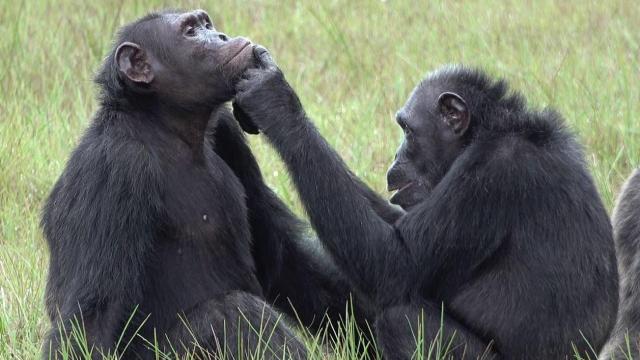Researchers have documented a remarkable behaviour among wild chimpanzees: chimps applying insects to wounds on themselves or others, perhaps as a sort of first aid. Little is still known about the practice, but the researchers suspect it to be the latest example of altruistic behaviour in nonhuman animals.
The act was reportedly first discovered in 2019 by Alessandra Mascaro, a volunteer at the Ozouga Chimpanzee Project in Gabon. Mascaro saw and was able to record a female chimpanzee dubbed Suzee examining a wound on her son Sia’s foot. Suzee then caught a flying insect, put it in her mouth, and applied the insect to Sia’s wound.
Intrigued, Mascaro and her colleagues began to watch for the behaviour among chimpanzees in the group. Over the next 15 months, they documented the same practice happening 76 times, with chimpanzees doing it to themselves or others. The team’s findings were published Monday in Current Biology, complete with the original video of Suzee and her son Sia.
Animals using their natural environment to self-medicate is far from unheard of. Many creatures, including bears, apes, and deer, are thought to ingest plants with medicinal properties. And given that the insects are being applied to wounds, the researchers surmise that the act is some form of medical treatment. If it is, it seems to be the first instance of insect therapy ever spotted in the wild.
“The application of insects or insect parts to an individual’s own wound or the wound of a conspecific has never been reported,” the study authors wrote.
While the practice might seem gross, the chimps may know something we don’t about the medicinal benefits of certain bugs. To this day, humans use bloodsucking leeches to clean up wounds, and some research has suggested that insects could carry antimicrobial properties. It’s also possible that they could have a painkilling effect.
The discovery suggests a level of chimp compassion as well. Most instances of insect first aid the team saw involved self-treatment. But sometimes, as with Suzee and her son, the chimps helped patch others up. The act appears to be a clear-cut showcase of “prosocial behaviour” — doing something for another without an obvious benefit to oneself.
“This is, for me, especially breathtaking because so many people doubt prosocial abilities in other animals,” said study author Simone Pika, a cognitive biologist at Osnabrück University in Germany, in a statement. “Suddenly we have a species where we really see individuals caring for others.”
That said, it’s always difficult to interpret the motivation behind nonhuman animal behaviours, and much is still unclear about this particular activity. Next, the researchers plan to try figuring out which specific insects are being used by the chimps and why.
Editor’s Note: Release dates within this article are based in the U.S., but will be updated with local Australian dates as soon as we know more.
